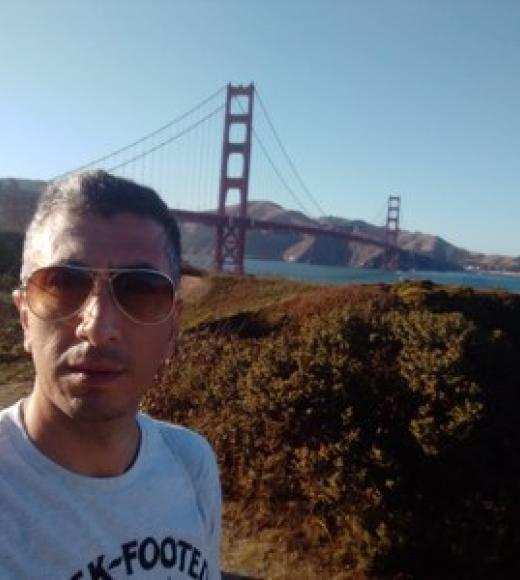
Position Title
Ph.D. Candidate and Associate Instructor
- cozdemir@ucdavis.edu
- https://scholar.google.com/citations?user=iR6ND3wAAAAJ&hl=en
- https://wordpress.com/stats/day/cetinozdemircom.wordpress.com
- https://about.me/ctnozdmr
- https://www.linkedin.com/feed/?trk=hb_signin
Education
- Ph.D., Sociology, University of California, Davis, CA, 2018-2025
- M.A., Sociology, University of California, Davis, CA, 2018-2020
- QP: "Afghan Refugee Men’s Attitudes Toward Afghan Women’s Participation in the Labor-Market in Sacramento and Its Effects on Men’s Roles"
- M.A., International Relations (English), Marmara University, İstanbul, 2013-2016
- Thesis: “An Evaluation of the Integration Process of Turkey to the World Capitalist Economic System After World War II Within the Framework of the Uneven and Combined Development Approach”
- B.A., Sociology (English), Marmara University, İstanbul, 2006-2011
About
I am a Ph.D. candidate and an Associate Instructor. My research interests encompass Internal/International Migration, Gender, Comparative and Historical Sociology, International Relations Theories, Sociology of International Relations, Qualitative Research Methods, and Classical and Contemporary Theories.
Research Focus
My dissertation project, titled “No Safe Place for Refugees: A Comparative Analysis of Afghan Refugees’ Insecurities in the United States and Türkiye,” focuses on the insecurity and precariousness faced by Afghan refugees in these two countries. The research analyzes how Afghan refugee men experience and navigate shifts in physical insecurity in Afghanistan and legal, economic, social, and gendered insecurities in the United States and Türkiye. This study is grounded in the human security framework, emphasizing the rights of refugees, political structures, economic institutions, and cultures that create human security. My methodology involves a comparative study with semi-structured interviews and ethnographic observations of Afghans’ public spaces in three urban areas: Sacramento in the United States and Istanbul and Trabzon provinces in Türkiye.
The preliminary findings reveal that Afghan refugees encounter multifaceted economic, political, and social insecurities. In the United States, they experience legal inclusion thanks to their immigration status as refugees with Special Immigrant Visas and the United Nations refugee resettlement program but grapple with economic and social exclusions due to skills downgrading and discrimination as Muslim migrants. In Türkiye, Afghan men face political exclusion due to their legal status since Türkiye does not grant refugee status to non-Europeans, and Afghan men endure precariousness and social exclusions. In both countries, particularly legal and economic insecurities have far-reaching effects on Afghan men who are not able to perform their breadwinner roles.
The first paper from the dissertation data contributes to discussions on refugee well-being and liminal legality by exploring how international protection status (IPS), a liminal legal status, shapes the well-being of Afghan refugees in Türkiye. IPS provides work authorisation and access to social services but restricts refugees' spatial settlement to Turkish satellite provinces, introducing spatial immobility. I employ the concept of ‘spatial liminal legality’ to analyse how the well-being of undocumented Afghan refugees in Istanbul and Afghan refugees with IPS in Trabzon varies in terms of economic integration, social integration, and future plans. As a spatialised liminal legality, the IPS work permit does not alleviate economic precarity for Afghan refugees who find employment in the labour market. The IPS independent work permits mitigate economic precarity for those establishing businesses, primarily small local shops in Trabzon. IPS is key to accessing education and bolsters neighbourhood relations, enhancing the well-being of Afghan refugees. However, access to healthcare services is temporary, negatively affecting long-term health outcomes. IPS allows Afghan refugees to be resettled in a third country, but resettlement is a prolonged and uncertain process that may fail. Türkiye's policymakers should formulate rights-based policies for Afghan refugees to grapple effectively with discrimination and inequality.
My research interests also encompass historical sociological approaches, one of which is the uneven and combined development (U&CD) approach on which I wrote my Master's thesis at Marmara University. The U&CD approach discusses how the capitalist crisis emerges in undeveloped or developing countries due to contradictions in modes of production. I employed this approach to explore historical sociology and International Relations debates through the binary conception of domestic and international structures. I analyzed Turkey’s incorporation into the capitalist system between 1945 and 1960 within this approach.
Publications
Ozdemir, C. (2025). The well-being of Afghan refugees in Türkiye within liminal legality. Journal of Ethnic and Migration Studies, 1–22. https://doi.org/10.1080/1369183X.2025.2561792
Özdemir, Ç . (2018). Turkey’s Integration to Capitalism Within Uneven and Combined Development Approach: “1945-1960”. International Journal of Political Science & Urban Studies, 6 (2), 27-54. DOI: 10.14782/ipsus.460126
Teaching
University of California, Davis & the Department of Sociology
Associate Instructor
Winter 2024 Immigration and Opportunity (Soc 4)
Winter 2022 Introduction to Social Research Methods (Soc 46)
Summer 2021 Self and Society (Soc 2)
Teaching Assistant
Spring 2025 Introduction to Sociology (Soc 001)
Winter 2025 Sociology of Gender (Soc 132)
Spring 2024 Social Relationships (Soc 135)
Spring 2023 Intermediate Social Statistics (Soc 106)
Winter 2023 Global Social Change (Soc 5)
Fall 2021 Intermediate Social Statistics (Soc 106)
Spring 2021. Introduction Social Statistics (Soc 46)
Winter 2021 Global Social Change (Soc 5)
Fall 2020 Global Social Change (Soc 5)
Spring 2020 Social Problems (Soc 3)
Winter 2020 Introduction to Social Research (Soc 46A)
Winter 2019 Introduction to Sociology (Soc 001)
Fall 2018 Self and Society (Soc 002)
Spring 2022 Classical Social Theory (Soc 100)
Fall 2019. Transnational Mobility (Soc 104)
Spring 2019 International Migration (Soc 104)
Awards
Fall 2024 UC Davis Graduate Program Fellowship ($14,359.00)
2024 UC Davis Dean’s Graduate Summer Fellowship Award ($6.000)
2024 UC Davis Sociology Program Travel Award and Small Research Grant ($2.500)
Fall 2023 UC Davis Graduate Program Fellowship ($14,359.00)
Fall 2022 UC Davis Graduate Program Fellowship ($13,000.00)
2022 UC Davis Dean’s Graduate Summer Fellowship Award ($5.500)
2022 UC Davis Sociology Program Small Research Grant ($1.000)
